Natural Environment →
→
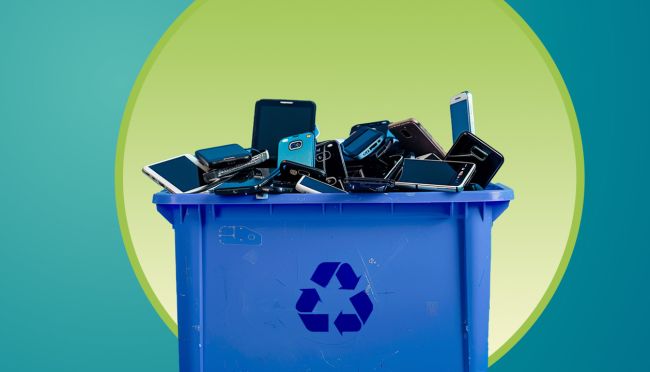
- 12 Mar 2024
- HBS Case
How Used Products Can Unlock New Markets: Lessons from Apple's Refurbished iPhones
The idea of reselling old smartphones might have seemed risky for a company known for high-end devices, but refurbished products have become a major profit stream for Apple and an environmental victory. George Serafeim examines Apple's circular model in a case study, and offers insights for other industries.
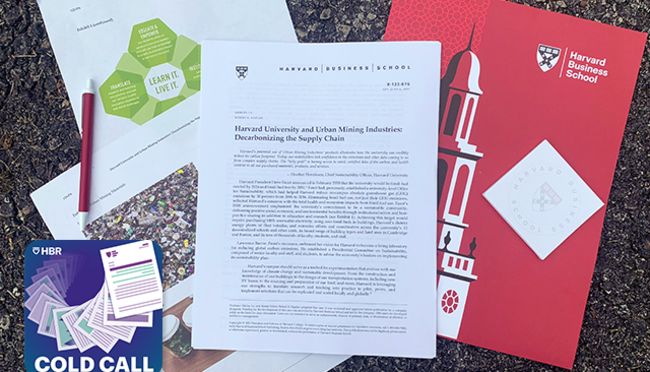
- 27 Feb 2024
- Cold Call Podcast
How Could Harvard Decarbonize Its Supply Chain?
Harvard University aims to be fossil-fuel neutral by 2026 and totally free of fossil fuels by 2050. As part of this goal, the university is trying to decarbonize its supply chain and considers replacing cement with a low-carbon substitute called Pozzotive®, made with post-consumer recycled glass. A successful pilot project could jump start Harvard’s initiative to reduce embodied carbon emissions, but it first needs credible information about the magnitude and validity of potential carbon reductions. Harvard Business School professor emeritus Robert Kaplan and assistant professor Shirley Lu discuss the flow of emissions along the supply chain of Harvard University’s construction projects, the different methods of measuring carbon emissions, including the E-liability approach, and the opportunity to leverage blockchain technology to facilitate the flow of comparable and reliable emissions information in the case, “Harvard University and Urban Mining Industries: Decarbonizing the Supply Chain.”
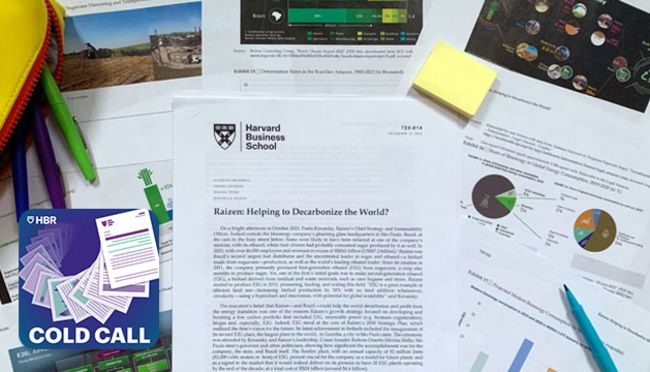
- 30 Jan 2024
- Cold Call Podcast
Can Second-Generation Ethanol Production Help Decarbonize the World?
Raízen, a bioenergy company headquartered in São Paulo, is Brazil’s leader in sugar and ethanol production and the world’s leading ethanol trader. Since its creation in 2011, the company had primarily produced first-generation ethanol (E1G) from sugarcane, a crop that can also be used to produce sugar. In 2015, Raízen also started to produce second-generation ethanol (E2G), a biofuel derived from residual and waste materials, such as cane bagasse and straw – which don’t compete with food production. The company’s growth strategy focused on developing and boosting a low carbon portfolio that focused on E2G, based on the belief that Raízen—and Brazil—could help the world decarbonize and profit from the energy transition. Paula Kovarsky, Raízen’s chief strategy and sustainability officer, was confident the company could become a global green energy champion. But after the board’s approval for the first round of E2G investments, she faced a complex challenge: how to expand the market for second-generation ethanol and other sugar-cane waste biofuels, in order to ensure Raízen’s long-term growth? Harvard Business School professor Gunnar Trumbull and Kovarsky discuss the company’s strategy for bringing second-generation ethanol to the world in the case, “Raízen: Helping to Decarbonize the World?”

- 29 Jan 2024
- Research & Ideas
Do Disasters Rally Support for Climate Action? It's Complicated.
Reactions to devastating wildfires in the Amazon show the contrasting realities for people living in areas vulnerable to climate change. Research by Paula Rettl illustrates the political ramifications that arise as people weigh the economic tradeoffs of natural disasters.
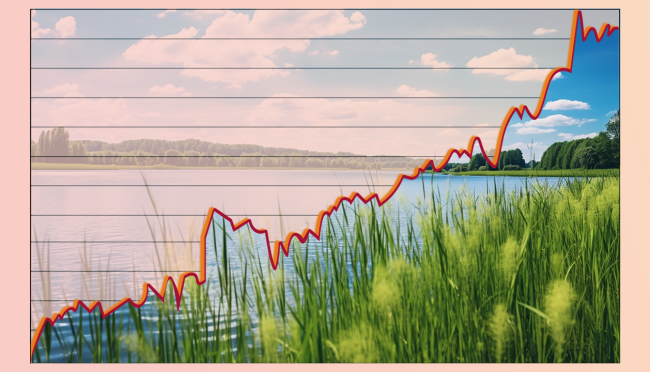
- 17 Jan 2024
- Research & Ideas
Are Companies Getting Away with 'Cheap Talk' on Climate Goals?
Many companies set emissions targets with great fanfare—and never meet them, says research by Shirley Lu and colleagues. But what if investors held businesses accountable for achieving their climate plans?

- 09 Jan 2024
- Research & Ideas
Could Clean Hydrogen Become Affordable at Scale by 2030?
The cost to produce hydrogen could approach the $1-per-kilogram target set by US regulators by 2030, helping this cleaner energy source compete with fossil fuels, says research by Gunther Glenk and colleagues. But planned global investments in hydrogen production would need to come to fruition to reach full potential.

- 02 Jan 2024
- Cold Call Podcast
Should Businesses Take a Stand on Societal Issues?
Should businesses take a stand for or against particular societal issues? And how should leaders determine when and how to engage on these sensitive matters? Harvard Business School Senior Lecturer Hubert Joly, who led the electronics retailer Best Buy for almost a decade, discusses examples of corporate leaders who had to determine whether and how to engage with humanitarian crises, geopolitical conflict, racial justice, climate change, and more in the case, “Deciding When to Engage on Societal Issues.”

- 12 Sep 2023
- What Do You Think?
Who Gets the Loudest Voice in DEI Decisions?
Business leaders are wrestling with how to manage their organizations' commitment to diversity, equity, and inclusion. If you were a CEO, which constituency would you consider most: your employees, customers, or investors? asks James Heskett. Open for comment; 0 Comments.

- 18 Jul 2023
- Research & Ideas
Will Global Demand for Oil Peak This Decade?
The International Energy Agency expects the world's oil demand to start to ebb in the coming years. However, Joseph Lassiter and Lauren Cohen say the outlook will likely be more complex, especially as poor and fast-growing regions seek energy sources for their economies.
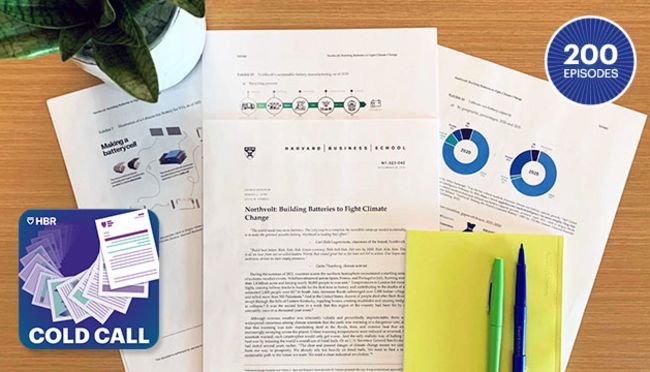
- 28 Apr 2023
- Cold Call Podcast
Sweden’s Northvolt Electric Battery Maker: A Startup with a Mission
In Stockholm, Sweden an upstart battery maker, Northvolt, is trying to recreate the value chain for European car manufacturers making the switch to EVs. With two founders from Tesla and two experienced financiers at the helm, the company seems bound for success. But can they partner with government, scale fast enough, and truly be part of the climate solution? Harvard Business School professor George Serafeim discusses what it takes to scale a business—the right people, in the right place, at the right time—with the aim of providing a climate solution in the case, “Northvolt, Building Batteries to Fight Climate Change.” As part of a new first-year MBA course at Harvard Business School, this case examines the central question: what is the social purpose of the firm?
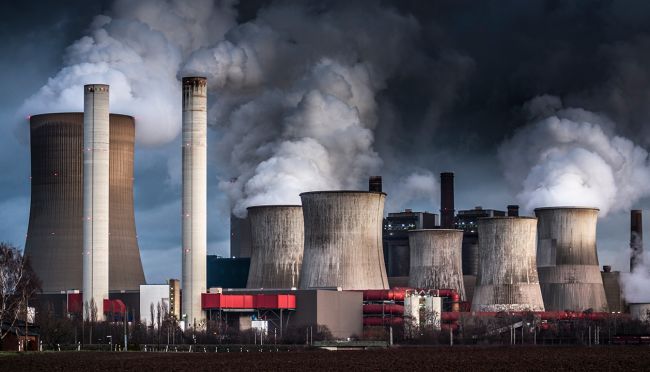
- 18 Apr 2023
- Research & Ideas
What Happens When Banks Ditch Coal: The Impact Is 'More Than Anyone Thought'
Bank divestment policies that target coal reduced carbon dioxide emissions, says research by Boris Vallée and Daniel Green. Could the finance industry do even more to confront climate change?

- 11 Apr 2023
- Cold Call Podcast
A Rose by Any Other Name: Supply Chains and Carbon Emissions in the Flower Industry
Headquartered in Kitengela, Kenya, Sian Flowers exports roses to Europe. Because cut flowers have a limited shelf life and consumers want them to retain their appearance for as long as possible, Sian and its distributors used international air cargo to transport them to Amsterdam, where they were sold at auction and trucked to markets across Europe. But when the Covid-19 pandemic caused huge increases in shipping costs, Sian launched experiments to ship roses by ocean using refrigerated containers. The company reduced its costs and cut its carbon emissions, but is a flower that travels halfway around the world truly a “low-carbon rose”? Harvard Business School professors Willy Shih and Mike Toffel debate these questions and more in their case, “Sian Flowers: Fresher by Sea?”
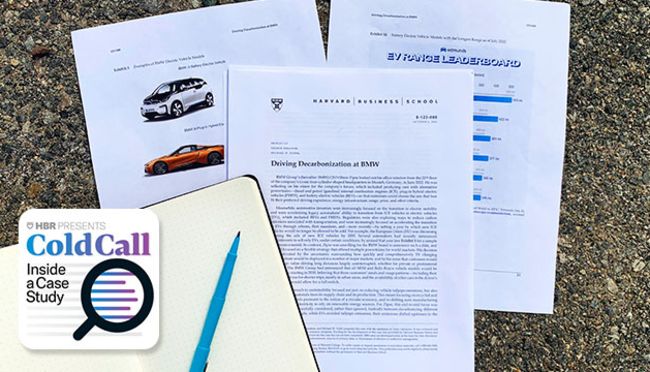
- 28 Mar 2023
- Cold Call Podcast
BMW’s Decarbonization Strategy: Sustainable for the Environment and the Bottom Line
In mid-2022, automakers, consumers, regulators, and investors were focusing on the transition from internal combustion engine (ICE) vehicles to electric vehicles (EV). While this would reduce tail-pipe emissions, it ignored the fact that the production of EVs—and especially their batteries—increases emissions in the supply chain. Many automakers were announcing deadlines by which they would stop selling ICE vehicles altogether, buoyed by investment analysts and favorable press. But BMW decided to focus on lifecycle emissions and pursued a flexible powertrain strategy by offering vehicles with several options: gasoline and diesel-fueled ICE, plug-in hybrid electric vehicles, and battery electric vehicles. That approach received a frostier reception in the stock market. Assistant Professor Shirley Lu discusses how BMW plans to convince stakeholders that its strategy is good for both the environment and the company’s financial performance in the case, “Driving Decarbonization at BMW.”
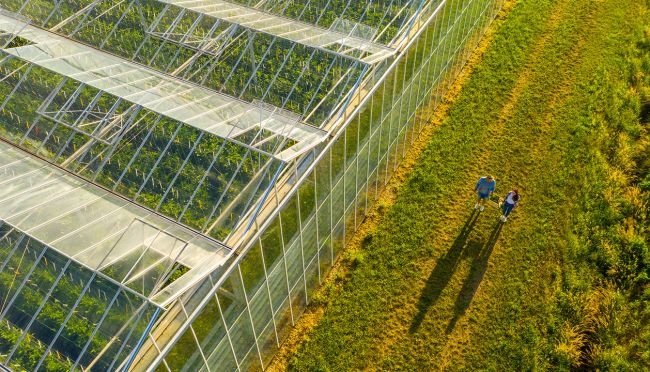
- 23 Mar 2023
- Research & Ideas
As Climate Fears Mount, More Investors Turn to 'ESG' Funds Despite Few Rules
Regulations and ratings remain murky, but that's not deterring climate-conscious investors from paying more for funds with an ESG label. Research by Mark Egan and Malcolm Baker sizes up the premium these funds command. Is it time for more standards in impact investing?

- 13 Jan 2023
- Research & Ideas
Are Companies Actually Greener—or Are They All Talk?
More companies than ever use ESG reports to showcase their social consciousness. But are these disclosures meaningful or just marketing? Research by Ethan Rouen delves into the murky world of voluntary reporting and offers advice for investors.
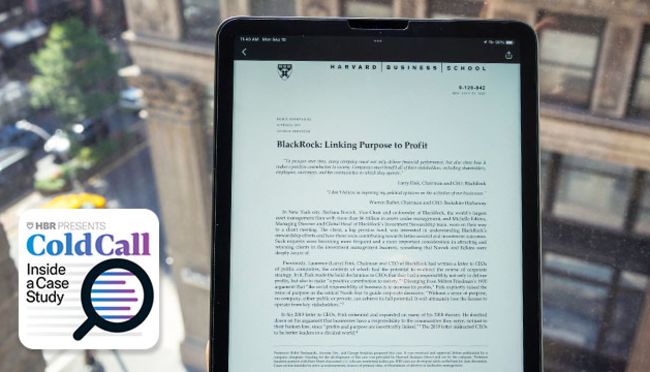
- 20 Sep 2022
- Cold Call Podcast
Larry Fink at BlackRock: Linking Purpose to Profit
In 2014, Larry Fink started writing letters to the leaders of some of the largest publicly listed companies, urging them to consider the importance of environmental, social, and governance (ESG) issues. Fink is the chairman and CEO of BlackRock, one of the largest asset management houses in the world. The firm’s success was rooted in its cost-effective, passive investment products that rely more on tracking indices and funds. But Fink wanted his firm to engage with the companies in which they invest and hold them accountable for their social and environmental impacts. What role should investors play in urging business leaders to take environmental, social, and governance issues more seriously and enforcing compliance? Harvard Business School professor George Serafeim discusses the merits of Fink’s approach, the importance of corporate investments in ESG themes, and how to lead a company driven by purpose and profit in his case, “BlackRock: Linking Purpose to Profit,” and his new book Purpose and Profit: How Business Can Lift Up The World.
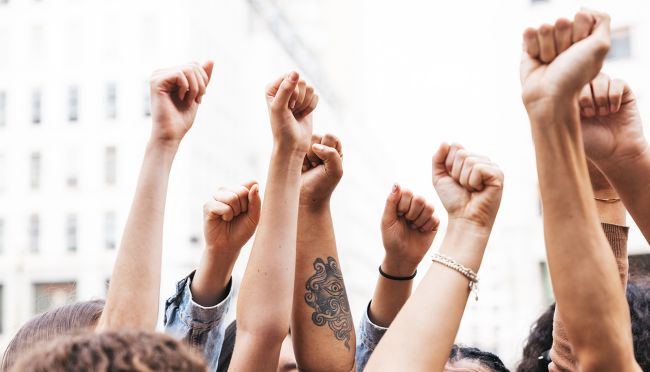
- 28 Jun 2022
- Book
The Moral Enterprise: How Two Companies Profit with Purpose
Despite polarized attitudes, Rebecca Henderson argues that it's the perfect time for companies to reset their moral compass. In an essay from the book A Political Economy of Justice, she explores the social efforts of Cadbury and Unilever.

- 22 Feb 2022
- Cold Call Podcast
How to Scale a Startup Marketplace for Used Furniture
AptDeco, a peer-to-peer marketplace for used furniture in the New York City area, was growing rapidly in the massive $120 billion furniture market, despite its complexity and high costs. Co-founders Reham Fagiri and Kalam Dennis were considering different options to scale the business, including converting sellers into buyers and vice versa, finding superusers to fuel the supply for their platform, expanding to new markets, and rebranding with a sustainability focus. Professor Ayelet Israeli and AptDeco co-founder Kalam Dennis discuss the best way to scale the business in the case, “AptDeco: Circular Economy Furniture Marketplace.” Open for comment; 0 Comments.

- 25 Jan 2022
- Cold Call Podcast
How Footwear Startup Allbirds is Decarbonizing Fashion
In 2021, the footwear startup Allbirds was extending its product range into apparel and expanding beyond its online store to open more retail stores around the world. It was also freely sharing its know-how and material innovations with its competitors to try to scale its efforts to decarbonize fashion, by substituting natural materials for conventional petroleum-based materials and leather. But the company also had to find ways to remain differentiated, based on design and comfort. Professor Mike Toffel and Allbirds co-founder and CEO Joey Zwillinger discuss the growing environmental impact of the fashion industry and how the company managed the tension between advancing its environmental mission and staying ahead of competitors in the case, Allbirds: Decarbonizing Fashion. Open for comment; 0 Comments.

When It Comes to Climate Regulation, Energy Companies Take a More Nuanced View
Many assume that major oil and gas companies adamantly oppose climate-friendly regulation, but that's not true. A study of 30 years of corporate advocacy by Jonas Meckling finds that energy companies have backed clean-energy efforts when it aligns with their business interests.